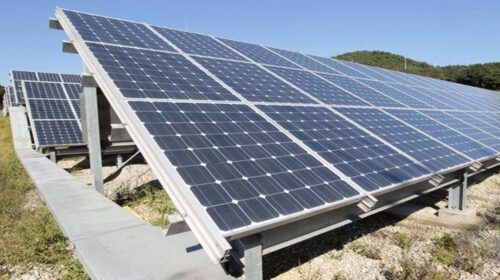Close to two years after the launch of approved list of model and module manufacturers (ALMM) for supplies to solar projects, no Chinese manufacturer has been approved by the Indian government. To be on the list of approved supplier, a firm is required to undergo mandatory inspection of models and manufacturing sites.
Chinese manufacturers told FE despite completing all the necessary formalities none of their sites and models were inspected by the National Institute of Solar Energy or NISE, the nodal agency mandated by the Indian government, due to the travel restrictions between India and China.
The manufacturers said their suggestion to the ministry of new and renewable energy (MNRE) to use global third-party audit firms in China to inspect the sites hasn’t elicited response from the ministry either. It would have helped the Indian government save on time due to restrictions, and heavy expenses on travel and accommodation.
Chinese manufacturers used to cater to 85% of India’s total solar panel and cells requirement. There is a concern that non-approval of Chinese manufacturers will lead to an increase in panel prices since India doesn’t have the capacity to meet its requirement. The impending basic customs duty of 40% on solar panel imports would add to the overall cost.
India plans to achieve 175 GW of renewable target by December 2022 and 450 GW by 2030.
Manish Narula, senior director of business development (India) at China’s Jinko Solar, told FE, “Since the approvals are stuck for want of inspection, we suggested Indian government to use the third party audit agencies such as TUV Rhineland who are present globally and have branches in China as well.
“These audit firms have the skills to audit huge sites in China unlike the Indian agencies who may not have audited sites as large as 30-40 GW at a single location,” Narula said.
“Government can also provide deemed approval to the global top-5 rated companies till big players are enlisted in ALMM to support Indian IPPs (independent power producers),” Narula said.
A senior MNRE official on, conditions of anonymity, told FE, “We will look at enlisting foreign companies as and when the travel restrictions are eased. We have already enlisted a cumulative capacity of 11 GW which is higher than the capacity raised in any year in the last decade in India. This enlistment will only grow in coming years to meet our requirement.”
Another official from top five Chinese solar panel manufacturing firm told FE that Chinese firms supply just 8-9% of their manufacturing capacity to India. “We can easily compensate the loss by supplying to other high margin countries in Middle-East and Americas that are not as price sensitive as India. The loss will be for India who will have to fend for high priced panels from domestic manufacturers, while customs duty from April will further increase tariffs.”
Large domestic manufacturers approved under ALMM get around 40%-50% of their revenue from exports. Tariff for projects are bound to rise if the entire capacity would be used to meet domestic requirement.
Tariff for solar projects dropped to Rs 1.99/kWh recently and ranges between Rs 2/kWh-Rs 2.80/kWh. “This would shoot beyond Rs 3.50/kWh to Rs 4.0/kWh if Indian developers only depend on domestic manufacturers,” another manufacturer said.
Gautam Das, co-founder of Oorjan Cleantech said “Volatility in panel prices have continued and BCD (basic custom duty) too is expected from April next year. Currently, we are focussing on procurement where panels are expected to be delivered prior to March 2022 end.”
In April 2020, MNRE notified compulsory registration of models and manufacturers of solar panels, to be eligible to participation in government solar projects. The intention was to set a quality benchmark for procurement of solar panels and cells in any government solar projects.







